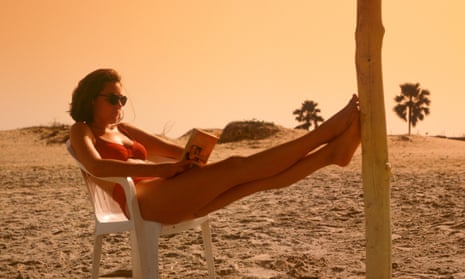Emma Straub’s new novel, Modern Lovers, is one book you can judge by its cover, apparently. The bright, cheerful yellow and green cover signifies something you’d like to take on vacation. This was a strategy that worked well for Straub’s last novel, The Vacationers, whose light blue colour, in a similar motif, helped it to the bestseller lists of 2015.
The marketing is so blatant, finally, that the notoriously acerbic Michiko Kakutani – in a largely positive review in the New York Times – picked up on it: “With its sunny cover and May 31 publication date, the book looks like designated vacation reading – but it’s just too deftly and thoughtfully written to be relegated merely to the beach.”
The “beach read” has become such a ubiquitous concept in contemporary literature that we assume it has always been around. In fact, the term only emerged in the 1990s, usually in book trade publications such as Booklist and Publisher’s Weekly. It was only around the middle of the decade that it migrated into the general lexicon and became something literary journalists began using.
It’s hard to pinpoint the first usage, but the summer of 1990 is when many writers began, which leads me to believe that somewhere out there is a canny book publicist sitting on the fact that he or she coined the term for a release that summer.
Vacation reading is not a new concept. Ever since the 19th century, when novels were considered relatively sinful indulgences, leisure and fiction-reading have been closely associated. But it was not until the wide popularization of paperbacks in America in the middle of the last century that you began to see the beach so closely entwined with a page-turning thriller.
Now the term is so ubiquitous that its definitions are a point of contention. Many people, I’ve noticed by informally polling friends, are prone to distinguishing a beach read by genre. Some people thought all thrillers are beach reads; others thought all romances are. Some people thought only mass market paperbacks are eligible for beach read standards.
Some thought a beach read must somehow incorporate summer or a vacation into the plot. Others thought it should be more escapist than that. Still others thought that the beach read was a way to designate the one summer bestseller that everyone was going to read. Gone Girl came up a lot. And still others thought the concept is gendered, that books marketed to women are more prone to being called beach reads. This is perhaps true, but in a survey of the literature, as it were, I found it applied to plenty of male books, and in particular those written by James Patterson.
Still, the essence of the beach read, most could agree, was more of a mood than anything else: attached to vacation, the book shouldn’t have any really weighty themes or social significance. It should be enjoyable and easy, with brisk pace and simple diction. An element of fantasy – either of the Straubian-gentrified Brooklyn type, the super-macho-spy-novel type, or the unicorns-and-feudal-lords type – is generally involved.
Above all, the reader shouldn’t feel they’re doing intellectual work. It’s all right if the beach read is a tearjerker, a bone-chiller or an adrenaline pumper: what it must never, ever be is something that gets the old neurons firing.
For a literary writer like Straub, this doesn’t quite sound like a compliment. It probably doesn’t sound like much of a compliment to the James Patterson types either. “Seriousness” tends to be in the eye of the beholder. It takes skill to write appealing, enjoyable, accessible fiction, too, as most commercial novelists will insist to their dying day.
But perhaps there is room for more definition creep. More than a few highly regarded things have been called beach reads over the years, with authors such as Thomas Pynchon and Donna Tartt coming under the beach umbrella. Literary novelists who have a strong handle on plot are often characterized as good vacation reads, because they manage to transport you elsewhere, away from the petty facts of ordinary life.
That’s what what people want in a vacation, after all, and while reading a book about Brooklyn might not quite hold the bragging rights of, say, spending a week in Bora Bora, there is an equal element of escape here. So don’t judge those beach reads on first impressions – or then again, maybe you should.

Comments (…)
Sign in or create your Guardian account to join the discussion